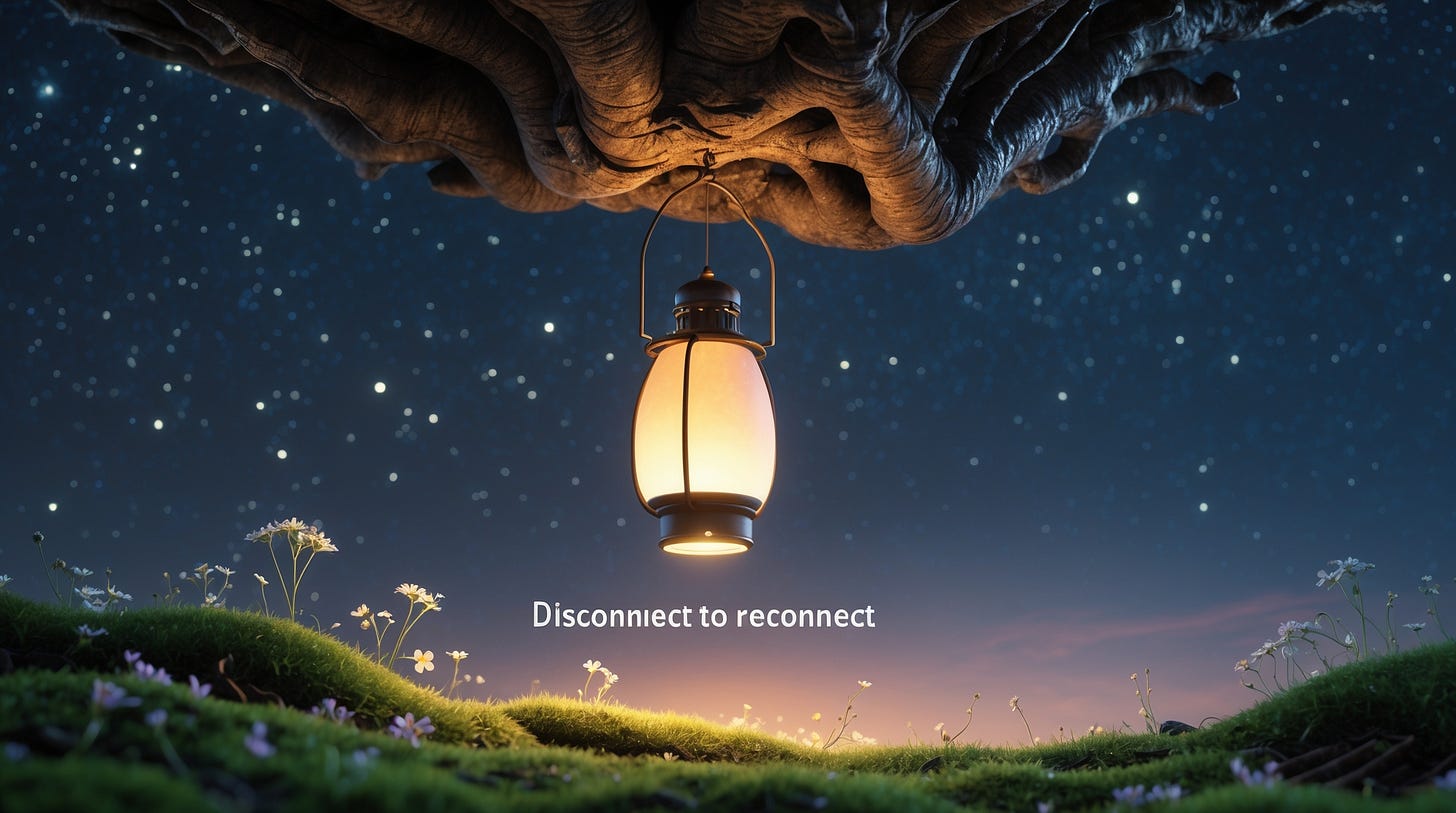The Power of Slow Disconnection in a World That Moves Too Fast
Because sometimes, the most productive thing you can do… is pause.
When was the last time you did nothing?
Not scrolling. Not multitasking. Not listening to a podcast while folding laundry, or catching up on emails while walking.
I mean truly nothing, just being present, unhurried, still.
It’s not a common experience anymore, is it?
We live in a world obsessed with speed. Faster checkouts, instant replies, 2x playback, overnight results. We’re constantly encouraged to optimize, hack, and hustle.
But here’s the quiet truth:
What we gain in efficiency, we often lose in clarity, creativity, and connection.
This is an invitation to slow down.
Let’s talk about the power of slow disconnection and why it might be the most radical thing you do for your mind, your focus, and your life.
We Are Not Built for Constant Input
If your brain feels foggy by noon, if your attention span is shrinking, if you're always “on” but rarely feeling fulfilled , you're not broken.
You're just overstimulated.
Every ping, scroll, headline, and background tab chips away at your mental space. We call it multitasking, but in reality, it’s more like constant partial attention, your brain skimming across a dozen things without ever landing.
And this isn't just about productivity. It's about how we connect with ourselves and others.
When we never unplug, we stop hearing the quiet signals from within, the gut feelings, the creative sparks, the subtle emotions that need space to breathe.
Slowness Isn’t Laziness, It’s Deep Living
We’re conditioned to associate slowness with falling behind. If you take a break, disconnect for a weekend, or don’t respond instantly, you risk being seen as unproductive or out of touch.
But here’s the truth no one profits from telling you:
Slowness isn’t laziness. It’s presence.
When you move slowly and intentionally, you notice things:
The way the light changes through the window.
How your coffee actually tastes.
The tension in your shoulders you've been ignoring.
A thought that’s been waiting for you to hear it.
Slowness creates room for reflection, recovery, and true connection, the kind that can’t be rushed.
3 Simple Ways to Practice Slow Disconnection
You don’t need a week-long retreat in the mountains (though that sounds nice). Small shifts can help you disconnect in meaningful ways and reconnect with yourself.
1. Start the day without your phone for the first 30 minutes
Let your mind wake up before the world floods in. Make tea, journal, stretch, or just sit. You'll be surprised how much calmer your nervous system feels.
2. Designate one “slow hour” a day
No screens. No agenda. Just you doing something slowly: a walk, a long bath, cooking without multitasking. Let time stretch out.
3. Practice digital “no-fly zones”
Block off times (evenings, weekends, or just 20 minutes after work) where you don’t check messages, news, or notifications. Guard that time fiercely.
The Hidden Power in Doing Less
Disconnecting doesn’t mean disengaging from life, it means re-engaging with what matters.
When you step out of the race, even briefly, a few things happen:
Your creativity comes back online
Your thinking becomes clearer
Your emotions get a voice
Your decisions become more aligned
And your nervous system finally takes a deep breath
Slowness restores you. Disconnection resets you.
It’s not a luxury. It’s a necessity in a hyper-connected world.
A Gentle Challenge
Here’s something simple you can try this week:
Choose one part of your day and make it deliberately slow.
No multitasking. No stimulation. Just you, doing one thing at a time.
And notice how it feels, in your body, your breath, your thoughts.
That’s the power of slow disconnection.
It doesn’t fight the fast world. It simply steps out of it — and finds peace where noise once lived.
Take care of your mind,
— Quiet Wisdom




I loved reading this post. Everybody knows by now that we would all be better off if we put down our phones and were more present in our lives. But you give clear, doable actions that one can take to facilitate that. I also loved how you addressed multitasking and overstimulation. I had a job like that once where I was basically responsible for all marketing and promotions, ranging from content development and execution, website creation to populating with copy, graphic design if all print and and digital visuals- from brochures to in-store and trade show signage. Anyway, I’m sure you catch my drift. And I stayed so overwhelmed and so scattered that I rarely anything very well at all. I ended up almost losing the job because I got so stressed out that my mental health began to suffer and the company I worked for was very small and offered no accommodations or protection for health conditions at all. I wish I had read your information back then so I could have deliberately changed my approach to my work and focused on one thing at a time. And to have been more realistic about what I could and could not promise to be able to do all at once. Thank you for sharing this. I’ll take the lesson and use it in situations in my life where I still feel overwhelmed or have way too many tabs open at the same time.